De Deense schrijver Carl Henry Valdemar Jussi Adler-Olsen werd geboren op 2 augustus 1950 in Kopenhagen. Zie ook alle tags voor Jussi Adler-Olsen op dit blog.
Uit: Selfies (Vertaald door Kor de Vries)
“Zoals altijd droeg haar gezicht de sporen van de voorbije nacht. Haar huid was een beetje uitgedroogd en de donkere kraters onder haar ogen leken dieper dan toen ze naar bed ging.
Denise trok grimassen naar haar spiegelbeeld. Nu was ze een uur bezig geweest om de schades te herstellen en het werd nooit goed genoeg.
‘Je ziet eruit als een hoer en zo stink je ook,’ aapte ze haar moeders stem na terwijl ze haar ogen nog wat extra aanzette.
Op de zit-slaapkamers om haar heen kondigde het lawaai aan dat de andere huurders eindelijk wakker werden en dat het snel weer avond was. Het was een bekende deken van geluid: het gerinkel van flessen, het bij elkaar aankloppen om sigaretten te bietsen, een continu rennen naar het versleten ‘toilet met douche’, dat in het huurcontract ‘luxueus’ werd genoemd.
Nu was de minisamenleving van de onderklasse Denen in een van de donkerder straten van Frederiksstaden eindelijk op gang gekomen, op weg naar een volgende avond zonder uitgesproken doel.
Na een ogenblik keren en draaien stapte ze naar de spiegel toe en bekeek haar gezicht van dichterbij.
‘Spiegeltje spiegeltje aan de wand, wie is de mooiste van het land?’ zei ze met een verwaande glimlach terwijl ze haar spiegelbeeld met haar vingertoppen liefkoosde. Ze tuitte haar lippen, liet haar vingers langs haar heupen omhoog naar haar borsten glijden en verder langs haar nek door haar haar. Vervolgens plukte ze een paar pluisjes van haar angorablouse, bracht wat foundation aan op een paar plekjes die onvoldoende waren bedekt en stapte heel tevreden achteruit. Haar geëpileerde en omhoog gestreken wenkbrauwen hadden samen met de Neulash-versterkte wimpers haar ‘appearance’, zoals zij het noemde, verstevigd. Het had haar blik dieper en de gloed van haar iris intenser gemaakt en gaf haar met weinig middelen een extra snufje onbenaderbaarheid.
Kort gezegd was ze klaar om de wereld te betoveren.”

Jussi Adler-Olsen (Kopenhagen, 2 augustus 1950)
De Amerikaanse schrijver James Baldwin werd op 2 augustus 1924 in Harlem, New York, geboren. Zie ook alle tags voor James Baldwin op dit blog.
Uit:The fire next time
“Dear James:
I have begun this letter five times and torn it up five times. I keep seeing your face, which is also the face of your father and my brother. Like him, you are tough, dark, vulnerable, moody — with a very definite tendency to sound truculent because you want no one to think you are soft. You may be like your grandfather in this, I don’t know, but certainly both you and your father resemble him very much physically. Well, he is dead, he never saw you, and he had a terrible life; he was defeated long before he died because, at the bottom of his heart, he really believed what white people said about him. This is one of the reasons that he became so holy. I am sure that your father has told you something about all that. Neither you nor your father exhibit any tendency towards holiness: you really are of another era, part of what happened when the Negro left the land and came into what the late E. Franklin Frazier called “the cities of destruction.” You can only be destroyed by believing that you really are what the white world calls a nigger. I tell you this because I love you, and please don’t you ever forget it.
I have known both of you all your lives, have carried your Daddy in my arms and on my shoulders, kissed and spanked him and watched him learn to walk. I don’t know if you’ve known anybody from that far back; if you’ve loved anybody that long, first as an infant, then as a child, then as a man, you gain a strange perspective on time and human pain and effort. Other people cannot see what I see whenever I look into your father’s face, for behind your father’s face as it is today are all those other faces which were his. Let him laugh and I see a cellar your father does not remember and a house he does not remember and I hear in his present laughter his laughter as a child. Let him curse and I remember him falling down the cellar steps, and howling, and I remember, with pain, his tears, which my hand or your grandmother’s so easily wiped away.“
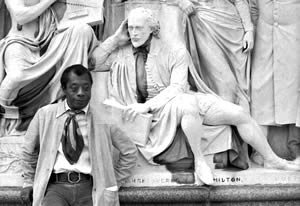
James Baldwin (2 augustus 1924 – 1 december 1987)
De Chileense schrijfster Isabel Allende werd geboren in Lima op 2 augustus 1942. Zie ook alle tags voor Isabel Allende op dit blog en ook mijn blog van 2 augustus 2010.
Uit:De Japanse minnaar (Vertaald door Henk van den Heuvel)
“Irina Bazili ging bij Lark House aan de slag in 2010, drieëntwintig jaar jong en zonder veel illusies, want al sinds haar vijftiende zwierf ze van stad tot stad als een meisje van twaalf ambachten en dertien ongelukken. Ze kon niet vermoeden dat ze in dit bejaardencentrum bij Berkeley haar ideale werkkring zou vinden en dat ze in de drie jaar die volgden even gelukkig zou worden als in haar kindertijd, voordat het noodlot haar toekomst had vergald. Lark House was rond 1950 gesticht om bejaarden met een schamel inkomen een menswaardig onderdak te bieden en had door onduidelijke oorzaken vanaf het begin progressieve intellectuelen, overtuigde esoterici en minder geslaagde kunstenaars aangetrokken. Met de jaren was het in een aantal opzichten veranderd, maar nog steeds liet het ieder van zijn bewoners naar draagkracht betalen om zo in theorie een vorm van maatschappelijke en raciale diversiteit na te streven. In de praktijk bleken het allemaal blanken uit de middenklasse, de diversiteit beperkte zich tot een mistig onderscheid tussen vrijdenkers, personen die het in het spirituele zochten, sociale actievoerders, milieuactivisten, nihilisten en een paar van de weinige hippies die er rond de Baai van San Francisco nog in leven waren.
Tijdens Irina’s eerste gesprek met Hans Voigt, de directeur van het centrum, liet deze haar weten dat ze nog te jong was voor zo’n verantwoordelijke functie. Maar omdat er dringend in een vacature op de afdeling administratie en begeleiding moest worden voorzien, mocht ze als invalkracht aan het werk zolang de juiste gegadigde niet was gevonden.”
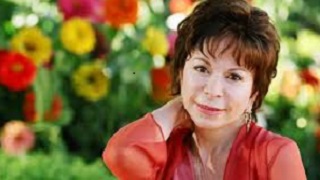
Isabel Allende (Lima, 2 augustus 1942)
De Duitse schrijfster Kristine Bilkau werd geboren op 2 augustus 1974 in Hamburg. Zie ook alle tags voor Kristine Bilkau op dit blog.
Uit: Die Glücklichen
„Auf dem Herd zischt die espressokanne, dazu hat Georg wieder Milch aufgesetzt. »Da ist Kaffee, wenn du möchtest«, sagt er, den Blick weiter auf die Zeitschrift gerichtet. sie stellt die Gasflamme aus, »ich bin heut nicht müde«, sagt sie, kann jedoch ein Gähnen nicht unterdrücken. Georg blickt sie fragend an, sie hält sich die Hand vor den Mund und muss lachen. »ich brauch heut keinen Kaffee, ich bin konzentriert genug.« Die Milch gießt sie in einen Becher und rührt Honig hinein, Koffein kann Hände zittern lassen, warme Milch beruhigt die nerven.
Sie hat konzentriertgesagt, obwohl sie angespannt dachte. Doch sie will nicht Georgs neugier wecken, sie will nicht darüber reden. es wird von allein vergehen, wenn sie erst in ihren alten Rhythmus zurückgefunden hat. seit es Matti gibt, fallen ihr abends die Augen zu, nun muss sie um diese Zeit wieder hellwach sein. nach der Vorstellung geht es für manche Kollegen noch weiter, in den Nachtclub des Theaters, wo ihnen die Bühne gehört, wo sie das spielen dürfen, was sie wirklich wollen. Sie aber wird nach Hause eilen, nichts wie ins Bett gehen, sie wird auf den Schlaf warten und wissen, dass Matti sie bald rufen wird, selten schafft er mehr als drei oder vier stunden am Stück ohne aufzuwachen. Ihre nimmermüden Ohren werden seine Stimme oder sein Weinen erwarten. Die Leuchtziffern des Weckers im Auge, wird sie an den kommenden Tag und den nächsten Abend denken. sie hat Sehnsucht nach den letzten Wochen der Schwangerschaft, nach der Langsamkeit und der Ruhe dieser Zeit. als sie zu Hause Musik machte, ohne Dirigent, ohne Kollegen, ohne Publikum.
Sie spielte für einen unsichtbaren Menschen. Ihre Musik und die Gegenwart des Kindes, das sich unter ihrer Bauchdecke regte. sie war allein und wusste doch: Jemand hört mich.“
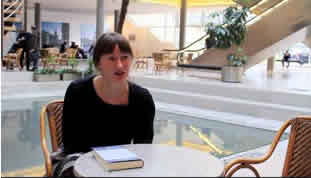
Kristine Bilkau (Hamburg, 2 augustus 1974)
De Franse dichter en schrijver Philippe Soupault werd geboren op 2 augustus 1897 in Chaville bij Parijs. Zie ook alle tags voor Philippe Soupault op dit blog en ook mijn blog van 2 augustus 2010.
Rien que cette lumière
Rien que cette lumière que sèment tes mains
Rien que cette flamme et tes yeux
Ces champs cette moisson sur ta peau
Rien que cette chaleur de ta voix
Rien que cet incendie
Rien que toi
Car tu es l’eau qui rêve
Et qui persévère
L’eau qui creuse et qui éclaire
L’eau douce comme l’air
L’eau qui chante
Celle de tes larmes et de ta joie
Solitaire que les chansons poursuivent
Heureux du ciel et de la terre
Forte et secrète vivante
Ressuscitée
Voici enfin ton heur
Plus jamais
Je sais désormais que la vieillesse c’est déjà l’enfer
les remords les regrets les souvenirs
et les expériences l’expérience
ne plus être ce qu’on avait été
ne plus pouvoir aimer
et savoir que l’on pouvait aimer
Les témoignages du temps passé
Ne pouvoir oublier ce qu’on voulait oublier
et ces gloires que l’on sait posthumes
Ne pouvoir recommencer les commencements
Tendre les mains les bras les lèvres
et n’offrir que le néant
les mains vides les bras ouverts les lèvres ouvertes
et puis rien rien que rien
Pas la solitude mais l’absence
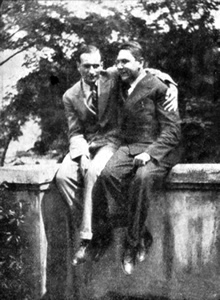
Philippe Soupault (2 augustus 1897 – 12 maart 1990)
Soupault (links) met de Tsjechische dichter Vítězslav Nezval in 1927
De Engelse dichter Ernest Christopher Dowson werd geboren op 2 augustus 1867 in Lee, een wijk in het zuidoosten van Londen. Zie ook alle tags voor Ernest Dowson op dit blog.
Amor Profanus
Beyond the pale of memory,
In some mysterious dusky grove;
A place of shadows utterly,
Where never coos the turtle-dove,
A world forgotten of the sun:
I dreamed we met when day was done,
And marvelled at our ancient love.
Met there by chance, long kept apart,
We wandered through the darkling glades;
And that old language of the heart
We sought to speak: alas! poor shades!
Over our pallid lips had run
The waters of oblivion,
Which crown all loves of men or maids.
In vain we stammered: from afar
Our old desire shone cold and dead:
That time was distant as a star,
When eyes were bright and lips were red.
And still we went with downcast eye
And no delight in being nigh,
Poor shadows most uncomforted.
Ah, Lalage! while life is ours,
Hoard not thy beauty rose and white,
But pluck the pretty fleeing flowers
That deck our little path of light:
For all too soon we twain shall tread
The bitter pastures of the dead:
Estranged, sad spectres of the night.
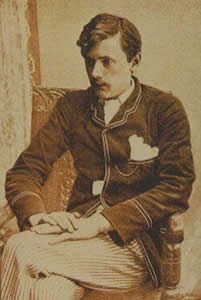
Ernest Dowson (2 augustus 1867 – 23 februari 1900)
De Hongaarse dichter en schrijver Zoltán Egressy werd geboren in Boedapest op 2 augustus 1967. Zie ook mijn blog van 2 augustus 2010 en eveneens alle tags voor Zoltán Egressy op dit blog.
Uit: Sauerampfer und Bratkartoffeln oder Die Drei Idioten (Vertaald door Géza Révay)
“Schiedsrichter:
Egal. Dann mach ich’s allein. Egal. Ich schaffe Ordnung. Stille. Es gab ein Diósgyôr-Honvéd, irgendwann. Da gibt’s ein Publikum, das wisst ihr auch. Der Schiedsrichter hat, ich weiß nicht mehr, wer er war, hat für Honvéd in der letzten Minute einen Freistoß gepfiffen.
Sie haben das Tor gemacht und haben dadurch 1:0 gewonnen.
Aber hinterher musste man den Schiedsrichter in Polizeiuniform hinausschmuggeln. Die Fans haben noch um Mitternacht die Ausfallstraßen mit ihren Wagen verbarrikadiert und am Bahnhof jeden
Zug durchsucht. Der Schiedsrichter wurde in einem Polizeiauto aus der Stadt gebracht, dabei war der Freistoß berechtigt! Ich sag’s nur, weil auch ich immer das pfeife, was angesagt ist.”
Zoltán Egressy (Boedapest, 2 augustus 1967)
De Amerikaanse schrijver en historicus Caleb Carr werd geboren op 2 augustus 1955 in New York. Zie ook alle tags voor Caleb Carr op dit blog en ook mijn blog van 2 augustus 2010.
Uit: The Angel of Darkness
“June 19th, 1919
There’s likely some polished way of starting a story like this, a clever bit of gaming that’d sucker people in surer than the best banco feeler in town. But the truth is that I haven’t got the quick tongue or the slick wit for that kind of game. Words haven’t figured much in my life, and though over the years I’ve met many of what the world counts to be the big thinkers and talkers of our times, I’ve stayed what most would call a plain man. And so a plain way of starting will suit me well.
The first thing to do, along these plain lines, is to say why I’ve closed the shop up and come into the back office on a night when there’s still plenty of business that might be done. It’s a fine evening, the kind what I used to live for: a night when you can take in all the affairs of the avenue with nothing more than your shirtsleeves for cover, blowing the smoke of a dozen good cigarettes up to the stars above the city and feeling, on balance, like maybe there’s some point to living in this madhouse after all. The traffic–gasoline-powered automobiles and trucks these days, not just clattering old nags dragging carriages and carts–has slowed quite a bit with the passing of midnight, and soon the after-supper ladies and gents will be over from the Albemarle Hotel and the Hoffman House to pick up their fine-blended smokes. They’ll wonder why I’ve dosed early, but they won’t wonder long before heading for some other shop; and after they’ve gone, quiet will settle in around this grand Flatiron Building with a purpose. She still lords it over Madison Square, the Flatiron does, with her solitary, peculiar silhouette and her fussy stone face, all of which, at the time she was built, had architects and critics going at each other tooth and nail. The Metropolitan Life Tower across the park may be taller, but it doesn’t have near the style or presence; and next to the Flatiron, buildings like Madison Square Garden, topped by its once-shocking statue of naked Diana, just seem like hangovers from another age, an age that, looking back, feels like it passed in the space of a night. It was a gay night, many folks’d say; but for some of us, it was a strange and dangerous time, when we learned things about human behavior that most sensible people would never want to know. Even the few that might’ve been curious got all the grimness they could stand from the Great War. What people want now’s a good time, and they want it with a vengeance.”
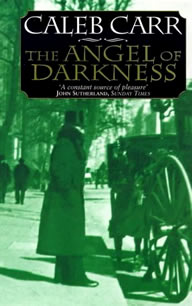
Caleb Carr (New York, 2 augustus 1955)
Cover
De Frans-Canadese dichter, schrijver, acteur, zanger en politiek activist Félix Leclerc werd geboren op 2 augustus 1914 in La Tuque, Quebec, Canada. Zie ook alle tags voor Félix Leclerc op dit blogen ook mijn blog van 2 augustus 2010.
L’hymne au printemps
Les blés sont mûrs et la terre est mouillée
Les grands labours dorment sous la gelée
L’oiseau si beau, hier, s’est envolé
La porte est close sur le jardin fané…
Comme un vieux râteau oublié
Sous la neige je vais hiverner
Photos d’enfants qui courent dans les champs
Seront mes seules joies pour passer le temps
Mes cabanes d’oiseaux sont vidées
Le vent pleure dans ma cheminée
Mais dans mon cœur je m’en vais composer
L’hymne au printemps pour celle qui m’a quitté
Quand mon amie viendra par la rivière
Au mois de mai, après le dur hiver
Je sortirai, bras nus, dans la lumière
Et lui dirai le salut de la terre…
Vois, les fleurs ont recommencé
Dans l’étable crient les nouveau-nés
Viens voir la vieille barrière rouillée
Endimanchée de toiles d’araignée
Les bourgeons sortent de la mort
Papillons ont des manteaux d’or
Près du ruisseau sont alignées les fées
Et les crapauds chantent la liberté
Et les crapauds chantent la liberté…
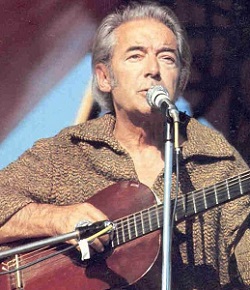
Félix Leclerc (2 augustus 1914 – 8 augustus 1988)
Zie voor nog meer schrijvers van de 2e augustus ook mijn blog van 2 augustus 2011 deel 2.
